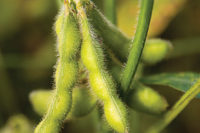
A soy-based adhesive has recently been introduced to the wood panel market. NutraSoy 7B, manufactured by Archer Daniels Midland, is used in foamed plywood glue. Soy flour is used to replace the often expensive and controversial animal blood used as a foaming agent in this adhesive.
"The foamed plywood glue made from soybeans is a high-performing alternative to adhesives made from animal blood," said Chuck Grabiel, commercialization manager at Omni Tech International and technical consultant for USB. "Substitution of soy flour for animal blood as the foaming agent in the plywood process produces panels that meet industry performance standards and offers cost effectiveness as an incentive for manufacturers."
Within the lumber industry, it is estimated that 230 North American mills produce approximately 40 billion square feet of particleboard, medium-density fiberboard, oriented strand board and plywood annually. Plywood holds the largest market share of the panel products. Although the plywood market growth has been flat, the use of the more cost-effective foamed glue manufacturing process has been increasing.
Soy adhesives provide improved performance and economics to the wood products industry. As research continues to support development of these products, the industry is already beginning to realize the value of switching to soy.
